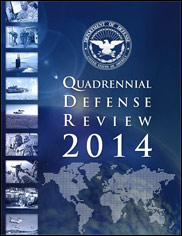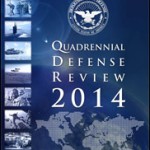
QDR – the national security challenge of climate change
 Today, the Department of Defense released the much anticipated Quadrennial Defense Review (QDR). As the Pentagon notes, the “QDR is a legislatively-mandated review of Department of Defense strategy and priorities. The QDR will set a long-term course for DOD as it assesses the threats and challenges that the nation faces and re-balances DOD’s strategies, capabilities, and forces to address today’s conflicts and tomorrow’s threats.”
Today, the Department of Defense released the much anticipated Quadrennial Defense Review (QDR). As the Pentagon notes, the “QDR is a legislatively-mandated review of Department of Defense strategy and priorities. The QDR will set a long-term course for DOD as it assesses the threats and challenges that the nation faces and re-balances DOD’s strategies, capabilities, and forces to address today’s conflicts and tomorrow’s threats.”
Once of those key challenges it notes is climate change:
Climate change poses another significant challenge for the United States and the world at large. As greenhouse gas emissions increase, sea levels are rising, average global temperatures are increasing, and severe weather patterns are accelerating. These changes, coupled with other global dynamics, including growing, urbanizing, more affluent populations, and substantial economic growth in India, China, Brazil, and other nations, will devastate homes, land, and infrastructure. Climate change may exacerbate water scarcity and lead to sharp increases in food costs. The pressures caused by climate change will influence resource competition while placing additional burdens on economies, societies, and governance institutions around the world. These effects are threat multipliers that will aggravate stressors abroad such as poverty, environmental degradation, political instability, and social tensions – conditions that can enable terrorist activity and other forms of violence.
Read more at the QDR website.






[…] 5 Conflicts Conflicts linked to, or arising from a lack to access water resources or the ability to feed, are likely to increase with more scarcity. This could happen for various reasons, such as impacts on crops, through extensive drought conditions or other weather extremes, shifts in weather patterns – for instance unseasonal precipitation, or change in freshwater availability from glacier melt. People will also migrate to seek better living conditions. In a report from 2014 The Pentagon noted: The pressures caused by climate change will influence resource competition while placing additional burdens on economies, societies, and governance institutions around the world. These effects are threat multipliers that will aggravate stressors abroad such as poverty, environmental degradation, political instability, and social tensions – conditions that can enable terrorist activity and other forms of violence. https://www.americansecurityproject.org/qdr-the-national-security-challenge-of-climate-change/ […]